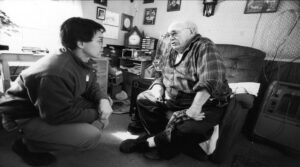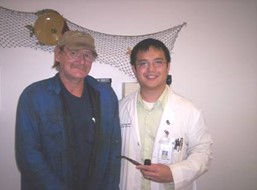June 22, 2024: Feeding the Inner Healer/Helper: Part B
Moving from Fee for Service to Prospective Payment in Primary Care: Advanced Primary Care: The Future of Primary Care – Part 14

Sponsored by WWW.THEMDCEO.COM
This is a continuation of the consideration of how an Advanced Medical Practice can Sharpen the Saw for each member of the team.
The Power of Gratitude
During a staff meeting ask each member of the team to share one thing they are grateful for in their work and in their personal lives. It will encourage people to self-disclose and thereby each team member becomes known more fully to their colleagues.
The Honored Patient

Ask the team members to identify patients/families they feel especially honored to care for. Identify patients who are working hard to care for others, and patients who have overcome great obstacles. Ask the patient if they would be willing to have their picture taken and placed on the walls or on the Center’s website. Patients will feel honored to be so recognized. (Make sure you get their permission in writing)
I first met Eugene when I took care of him on our inpatient family medicine service during my intern year. He was a man who did not have a family physician and relied on the generosity of volunteers at St. Anthony’s, our local free health clinic, to receive his health care. He was a long-time smoker, had hyperlipidemia, hypertension, and undiagnosed diabetes. I took care of him during one the darkest times in his life. Since he went decades without receiving routine primary care, his medical problems eventually cost him his left foot, which had to be amputated. He was devastated. Eugene is a proud man who provided not only for himself, but also his wife through his job working as manual laborer. We worked through the physical and the emotional toll his disease caused. He promised me that he would do anything to improve his life. When he stopped smoking, Eugene gave me his pipe and tobacco–I still have them sitting on my desk to this day to remind me why I chose to pursue family medicine. Every time I see Eugene in the office, he enthusiastically shares his gratitude and always knows how to make me smile. Despite his amputation, he is grateful to be alive and continues to have a refreshingly positive outlook on life. For these reasons, I feel honored to be his physician and his friend.
TedTalks provide a well of inspiration for all. Once a month share via internal listserv a poignant TedTalk with the team. During the next staff meeting, ask one or two in the team to share what the TedTalk meant to them. Here are a few TedTalks to get you started.
The Placebo Effect https://www.youtube.com/watch?v=KvT1a3kE_DA
The Four Things that Matter Most https://www.youtube.com/watch?v=vcMmx-6RIUY
What Matters in Medicine https://www.youtube.com/watch?v=UAVOVw1KnMA&t=148s
And don’t forget the value of humor.
Start with doctor jokes, clean ones. Who cares if they are silly. Let everyone have a good chuckle. Maybe start each team huddle or a staff meeting with someone telling a joke. It can be printed on a piece of paper or memorized. Have some fun!
Man calls the office: “My wife is pregnant, and her contractions are only two minutes apart!”
Doctor: “Is this her first child?” Man: “No! This is her husband!”
A man walks into a doctor’s office. He has a cucumber up his nose, a carrot in his left ear, and a banana in his right ear. “What’s the matter with me?” he asks the doctor. The doctor replies, “You’re not eating properly.”
Doctor: “Nurse, how is that little girl doing who swallowed 10 quarters last night?” Nurse: “No change yet.”
I went to the doctor, and he said I had acute appendicitis, and I said compared to who?
Some offices will place motivational posters on the walls of the conference room or the lunchroom. For the most part these are a waste of time because they are not connected to the lived experience of the team members. Create your own posters that have words or pictures that mean something to the group. Take a lesson from the TV show Ted Lasso.
For a powerful experience, once or twice a year, invite 8 – 10 selected patients to the staff meeting. Focus the discussion on each person’s experience of giving or receiving care in your Center. You will be amazed by what the patients have to say. Make sure to pick patients who are articulate and well-balanced. This is not a gripe session. Io be effective a skillful facilitator is required. For a model review this video: https://www.youtube.com/watch?v=akECUGH2SPg&t=30s
The value of curiosity – it’s an antidote for burnout
Hans Duvefelt, MD Author of A Country Doctor Writes: CONDITIONS: Diseases and Other Life Circumstances
Use your team’s quality improvement efforts to spark some curiosity among the clinicians and the staff. Ask the team to brainstorm and identify questions they have about how well they are doing with your operations. Identify topics that can be answered by one-person collecting data for a maximum of one day. Think small.
During a staff meeting, ask the team to identify patients or medical conditions they find puzzling. The group selects one topic, and someone is assigned the effort to search for answers/solutions. During the next meeting the answer(s) are shared, and a group discussion can follow.
Reading: Each quarter ask the team to pick a book/short story/article that all will read. Keep the book/story brief. There are plenty to choose from. An article in a magazine or journal might work. Many of the medical journals now have a stories/narrative medicine section.
Fit Over 50: Make Simple Choices Today for a Healthier, Happier You by Phillip Bishop and Walt Larimore M.D.
The Best Care Possible by Ira Byock, MD
The Four Things that Matter Most by Ira Byock, MD
Intuitive Wellbeing: Winning the Game of Health by Scott Conard, MD
Hey Doc”“Memoirs of a Rural Family Physician by Jamos Damos, MD
Trust Me I’m a Doctor” by Mark DePaolis, MD
Bryson City Tale by Walt Larimore, MD
Only Rock is Real by Sandra Cavallo Miller, MD
You may also choose to ask one or two people on your staff to be “the office culture coordinator” for a period. They will be responsible for suggesting ideas for the group to “sharpen their saw”. This need not be a time-consuming responsibility. Usually someone will make the effort to decorate the office for holidays and to celebrate birthdays. They would be a good one to encourage to coordinate this activity as well. This coordinator could be an administrator, a clinician as well as a staff person.
Remember the goal is to keep the spirit of healing/helping alive.
Scott Conard, MD Michael Tuggy, MD Susan Lindstrom Laurence Bauer, MSW, MEd
scott@scottconard.com MTuggy@converginghealth.com slindstrom@mypha.com Laurence.bauer@gmail.com
